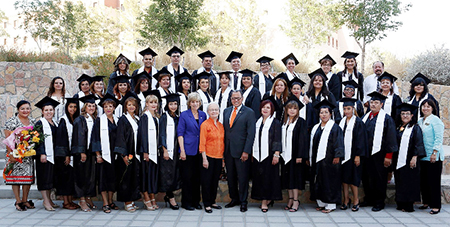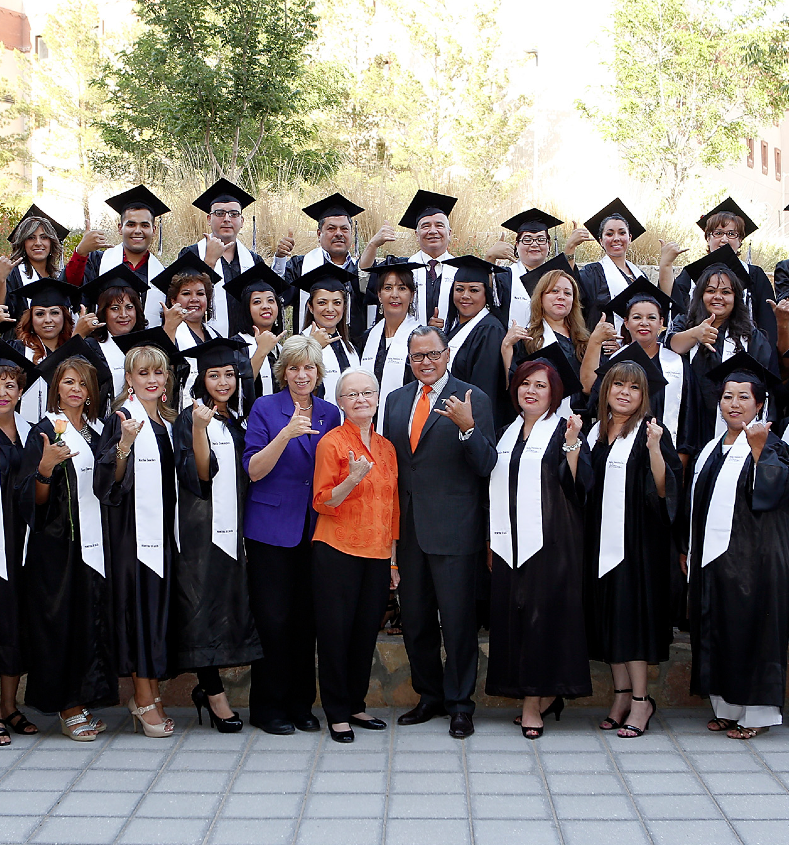By Laura L. Acosta
UTEP News Service
Even though Ramiro Guillen lived and worked along the U.S.-Mexico border most of his life, the photojournalist felt out of sync when he relocated to El Paso from Juárez, Mexico, on Jan. 1, 2014. Guillen needed to find a new job, learn English, sort out his finances and find medical care, but he didn’t know who to turn to for help.
“It’s hard to move to a new country where you don’t know what resources are available to help you,” Guillen said in Spanish. “I would come to El Paso to go to Walmart for fun, but living here was something else.”

Four months ago, Guillen enrolled in the Community Health Workers Training Program at The University of Texas at El Paso. The father of three children learned about the health and social services available in the community to help others like him start a new life.
On June 6, Guillen and 42 other trainees comprised the second class to graduate from the program. As a promotor de salud, or community health worker, Guillen is the person to whom others will now turn for help.
The 180-hour training program prepares immigrant and migrant women and men to become state-certified community health workers who will conduct outreach in underserved communities and raise awareness about health promotion, prevention, intimate partner violence and sexual and reproductive health. Before they can be certified by the State of Texas as community health workers, students must complete 1,000 cumulative hours of community health work services.
The training program at UTEP was developed in 2013 in conjunction with Familias Triunfadoras and the Department of Social Work at UTEP and Familias Triunfadoras is a community-based organization with a mission to empower women in colonias – communities along the Texas-Mexico border that may lack some basic living necessities.
“Being a journalist and a community health worker is different, but both have similar aspects,” Guillen explained. “When I was a journalist, I worked all beats – entertainment, sports, investigative journalism. I got to see what problems there are in the community. You go to a colonia and you see how a person lives in her home, with her kids, and what difficulties they have. Now, I have the tools to help the people who need it and with the experience that I have as a journalist, I think I can see things that others don’t.”
In addition to completing a 160-hour Community Health Worker/Promotora course certified by the Texas Department of State Health Services, students also must complete an additional 20-hour training on intimate partner violence and sexual and reproductive health. The two training modules were created last year by Eva Moya, Ph.D., assistant social work professor, and Silvia Chavez Baray, Ph.D., a lecturer in the social work department, as part of a community-based participatory research project on the social and health consequences of intimate partner violence.
Graduates from last year’s program are working at community organizations, clinics and at the Ventanilla de Salud, a health collaborative between UTEP and the Consulate General of Mexico in El Paso.
“Familias Triunfadoras and the UTEP Department of Social Work have partnered up again to promote community engagement and training of promotoras,” Moya said. “We are excited about having 43 additional, very talented peer educators in this community.”
For the past four months, students have been trained by UTEP faculty members, Familias Triunfadoras in San Elizario, the Centers for Disease Control and Prevention, and representatives from other community organizations on a wide range of topics that include intimate partner violence; sexual and reproductive health; chronic diseases such as diabetes, high blood pressure, and obesity; tuberculosis; HIV/AIDS and advocacy; the Affordable Care Act; health literacy; technology; and nutrition.
“We encourage you to keep growing as community health workers,” Maria Covernali Ortiz, director of Familias Triunfadoras, Inc., told graduates in Spanish during a special ceremony in the Health Sciences and Nursing Building. “It’s not just the classes that we offered on Saturdays. You need to look for resources, develop new skills and training.”
Raquel Chavira was emotional as she walked to the podium to collect her certificate and an orange rose.
Chavira came to the United States 22 years ago from Chihuahua, Mexico. Like many immigrants, she understands how difficult it is to find resources, such as housing, food, medical care and health information.
“I go to laundry mats, supermarkets, to look for people and tell them about the services we provide,” said Chavira, who works for Project Vida. “A lot of people know that agencies exist but they don’t know what services they offer. My job as a promotora is to connect these people with the agencies where they can get help.”
During the ceremony, El Paso State Sen. Jose Rodriguez encouraged graduates to continue their studies.
“This University is here for you and earning this certification could be your first step, but there are additional steps that you can take,” Rodriguez said in Spanish. “You’ve experienced the life of a student at UTEP and you know what can happen when you open the doors to education. Maybe we have doctors, nurses, pharmacists, dentists, specialists, among us. Don’t pass up on the opportunity that you are being offered to continue your education.”
According to Baray, several of this year’s graduates are studying for their GED and learning English. This year’s class included teachers, nurses, doctors and other professionals who studied in Mexico but are now planning to continue their education in the U.S.
Two graduates from last year’s class are enrolled at UTEP and one is taking classes at El Paso Community College.
“This training empowers them and gives them hope to continue their education,” Baray said.
